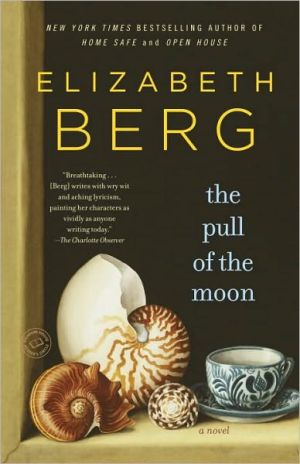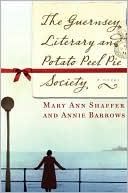The Pull of the Moon
Sometimes you have to leave your life behind for a while to see it and really live it freshly again. In this luminous and exquisitely written new novel by Elizabeth Berg, a woman follows the pull of the moon to find her way home. Now, in the middle of her life and with her soul fraying, Nan begins an impromptu trek across the country, inspired by a turquoise leather journal she sees in a bookstore and knows she must buy - and fill. As she writes in it, and talks with people she meets, she...
Search in google:
In the middle of her life, Nan decides to leave her husband at home and begin an impromptu trek across the country, carrying with her a turquoise leather journal she intends to fill. The Pull of the Moon is a novel about a woman coming to terms with issues of importance to all women. In her journal, Nan addresses the thorniness—and the allure—of marriage, the sweet ties to children, and the gifts and lessons that come from random encounters with strangers, including a handsome man appearing out of the woods and a lonely housewife sitting on her front porch steps. Most of all, Nan writes about the need for the self to stay alive. In this luminous and exquisitely written novel, Elizabeth Berg shows how sometimes you have to leave your life behind in order to find it. Publishers WeeklyWhat (in Range of Motion) seemed an unerring touch for the emotional truths of women's lives proves imperfect after all for Berg, who misses the mark in this story of a wife and mother who runs away to find herself. In a plot device reminiscent of Ann Tyler's Ladder of Years, Berg's protagonist, Nan, impulsively leaves her Massachusetts home soon after she turns 50, hitting the road to find a new sense of direction. "I have felt so long like I am drowning,'' she explains in a letter to her husband, Martin, as she begins a car trip westward with no destination in mind except to "come into my own.'' She chronicles both the geographical terrain and her inner landscape in further letters to Martin and to her grown daughter, Ruthie, and in a journal that has the tone of an adolescent's diary. Women will empathize with Nan's fear of aging and her gradual realization of the resentment she has long felt about filling the role of dutiful wife, but the epistolary device strips the story of immediacy, and the situations Nan describes are often unlikely or merely tame (she has a noisy tantrum at a beauty salon when she decides not to dye her gray hair; she invites a stranger into her cabin in the Minnesota woods and, when they go to bed, they just cuddle). Nan's conversations with other women are overdosed with saccharine, and her epiphanies are old hat. Self-indulgent and cloying, this is a one-tone narrative with almost none of the dramatic resonance Berg's fans have learned to expect. (Apr.)
\ Publishers Weekly\ - Publisher's Weekly\ What in Range of Motion seemed an unerring touch for the emotional truths of women's lives proves imperfect after all for Berg, who misses the mark in this story of a wife and mother who runs away to find herself. In a plot device reminiscent of Ann Tyler's Ladder of Years, Berg's protagonist, Nan, impulsively leaves her Massachusetts home soon after she turns 50, hitting the road to find a new sense of direction. "I have felt so long like I am drowning,'' she explains in a letter to her husband, Martin, as she begins a car trip westward with no destination in mind except to "come into my own.'' She chronicles both the geographical terrain and her inner landscape in further letters to Martin and to her grown daughter, Ruthie, and in a journal that has the tone of an adolescent's diary. Women will empathize with Nan's fear of aging and her gradual realization of the resentment she has long felt about filling the role of dutiful wife, but the epistolary device strips the story of immediacy, and the situations Nan describes are often unlikely or merely tame she has a noisy tantrum at a beauty salon when she decides not to dye her gray hair; she invites a stranger into her cabin in the Minnesota woods and, when they go to bed, they just cuddle. Nan's conversations with other women are overdosed with saccharine, and her epiphanies are old hat. Self-indulgent and cloying, this is a one-tone narrative with almost none of the dramatic resonance Berg's fans have learned to expect. Apr.\ \ \ \ \ Library JournalBerg Range of Motion, LJ 8/95 uses letters and diary entries to tell the story of 50-year-old Nan, who is coming to terms with her place in society as an older woman. The letters, written to her husband, attempt to explain her unplanned cross-country flight. The diary entries allow Nan to probe deeper into her past and to explore the reasons for her loss of self-esteem. Conveniently, Nan is a woman of privilege traveling in relative comfort, with no concern for the financing of her trip. Her letters to her husband include instructions to contact their architect so that on her return they can plan a new house she describes in fanciful detail. She has little or no anxiety about how her husband might react to her flight, and there seems to be nothing in her life beyond her relationship with him and with her college-age daughter. Berg's somewhat superficial treatment of an individual in transition is not altogether satisfying. Recommended for larger public libraries.-Rebecca A. Stuhr-Rommereim, Grinnell Coll. Libs., Ia.\ \ \ Kirkus ReviewsBerg's fourth novel in four years (Range of Motion, 1995, etc.) alternates mawkish diary entries with chilly letters home by a woman who's run away to "find herself" after 30 or so years of marriage, in a tale that seems better suited to the 1970s than the 1990s.\ Fifty-year-old Nan, who's never worked, writes daily bulletins to excoriated husband Martin from the road, letting him know obliquely why she left by sharing secrets, including the fact that she feels continually diminished by his habitual lack of attention to what she says; that she's been going through a rough menopause, "acutely missing my periods," and feeling like "some old gal;" that she fears the dark and hates that about herself; and that she wishes she and Martin could go live in a much smaller house by the ocean, with "golden-colored wooden stairs and a small fieldstone fireplace," urging Martin to call an architect and have plans drawn up for such a house when she returns home. Talk about mixed messages. In her italicized diary entries, she remembers her past (pre-Martin boyfriends from the 1960s, the ways in which she tried to raise her now-grown daughter, Ruthie, "to be different from me") and chronicles her encounters with other loners (a teen-aged boy in an Ohio mall who wants to sleep with her; a humiliated wife in an Iowa garden-supply store; a bereaved young husband in a Minnesota motor park). She faces her fears (sleeps outside in the moonless dark, confronts her sexuality alone in a motel room one night) and gradually begins to miss Martin. So, finally, she heads back home to Boston, scripting her reunion with Martin in letters that contain not a shadow of a doubt that he wants her back.\ The culture doesn't want her back—she's idle, self-absorbed, and dull in ways we haven't encountered for 20 years. An uninspiring concoction.\ \ \








